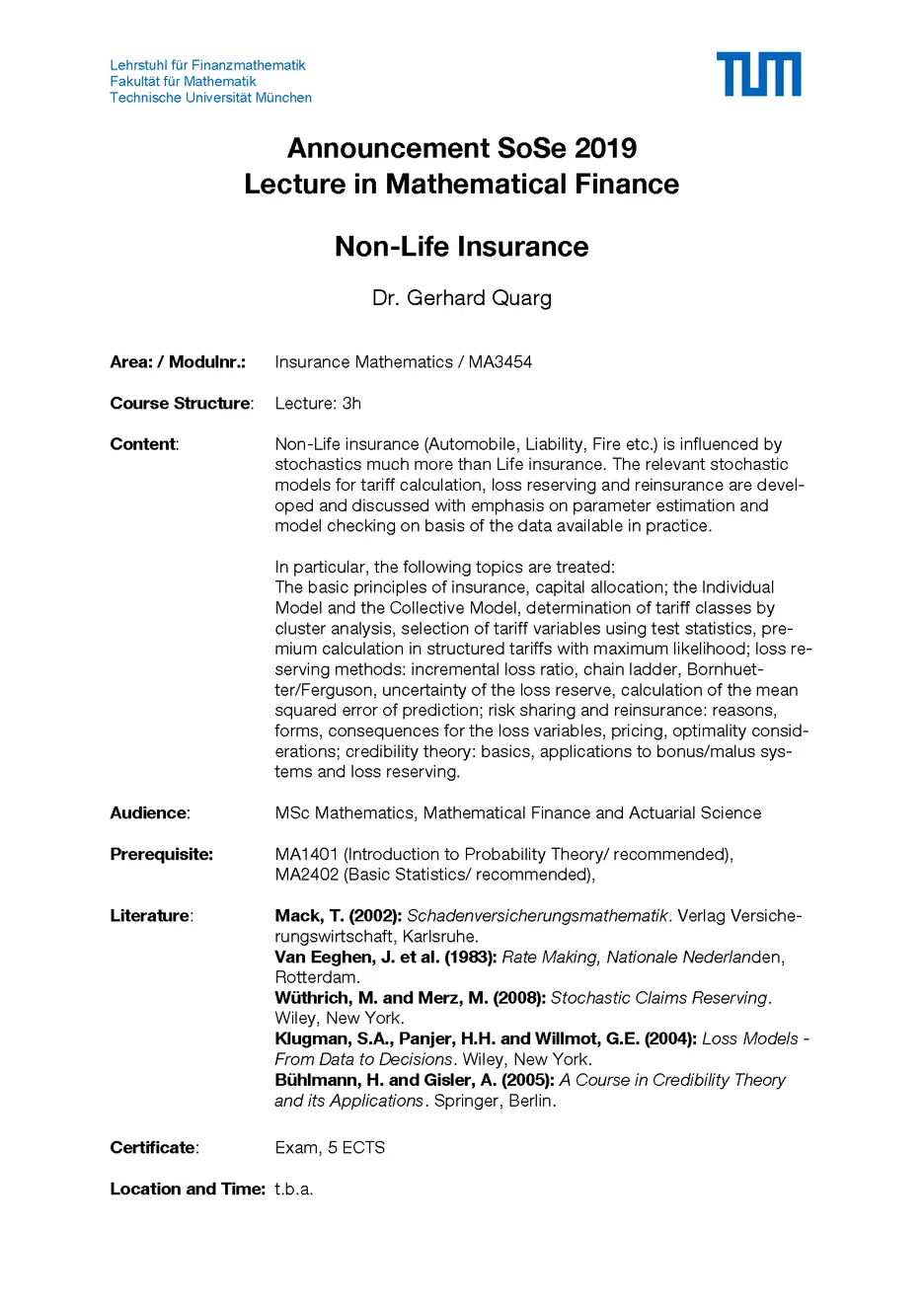Non-Life Insurance

Non-Life Insurance [MA3454]
| Vortragende/r (Mitwirkende/r) | |
|---|---|
| Nummer | 0000005218 |
| Art | Vorlesung |
| Umfang | 3 SWS |
| Semester | Sommersemester 2019 |
| Unterrichtssprache | Englisch |
| Stellung in Studienplänen | Siehe TUMonline |
| Termine | Siehe TUMonline |
Termine
- 25.04.2019 08:15-11:00 BC2 3.5.06, Hörsaal
- 02.05.2019 08:15-11:00 BC2 3.5.06, Hörsaal
- 09.05.2019 08:15-11:00 BC2 3.5.06, Hörsaal
- 16.05.2019 08:15-11:00 BC2 3.5.06, Hörsaal
- 23.05.2019 08:15-11:00 BC2 3.5.06, Hörsaal
- 06.06.2019 08:15-11:00 BC2 3.5.06, Hörsaal
- 27.06.2019 08:15-11:00 BC2 3.5.06, Hörsaal
- 04.07.2019 08:15-11:00 BC2 3.5.06, Hörsaal
- 11.07.2019 08:15-11:00 BC2 3.5.06, Hörsaal
- 18.07.2019 08:15-11:00 BC2 3.5.06, Hörsaal
- 25.07.2019 08:15-11:00 BC2 3.5.06, Hörsaal
Teilnahmekriterien
Lernziele
After successful completion of the module the students are able to understand and apply the main stochastic methods in the practice of Non-Life insurance.
Beschreibung
Non-Life insurance (Automobile, Liability, Fire etc.) is influenced by stochastics much more than Life insurance. The relevant stochastic models for tariff calculation, loss reserving and reinsurance are developed and discussed with emphasis on parameter estimation and model checking on basis of the data available in practice.
In particular, the following topics are treated:
The basic principles of insurance, capital allocation; the Individual Model and the Collective Model, determination of tariff classes by cluster analysis, selection of tariff variables using test statistics, premium calculation in structured tariffs with maximum likelihood; loss reserving methods: incremental loss ratio, chain ladder, Bornhuetter/Ferguson, uncertainty of the loss reserve, calculation of the mean squared error of prediction; risk sharing and reinsurance: reasons, forms, consequences for the loss variables, pricing, optimality considerations; credibility theory: basics, applications to bonus/malus systems and loss reserving.
In particular, the following topics are treated:
The basic principles of insurance, capital allocation; the Individual Model and the Collective Model, determination of tariff classes by cluster analysis, selection of tariff variables using test statistics, premium calculation in structured tariffs with maximum likelihood; loss reserving methods: incremental loss ratio, chain ladder, Bornhuetter/Ferguson, uncertainty of the loss reserve, calculation of the mean squared error of prediction; risk sharing and reinsurance: reasons, forms, consequences for the loss variables, pricing, optimality considerations; credibility theory: basics, applications to bonus/malus systems and loss reserving.
Inhaltliche Voraussetzungen
MA1401 Introduction to Probability Theory, MA2402 Basic Statistics
Empfohlene Literatur
Mack, T. (2002): Schadenversicherungsmathematik. Verlag Versicherungswirtschaft, Karlsruhe.
Van Eeghen, J. et al. (1983): Rate Making, Nationale Nederlanden, Rotterdam.
Wüthrich, M. and Merz, M. (2008): Stochastic Claims Reserving. Wiley, New York.
Klugman, S.A., Panjer, H.H. and Willmot, G.E. (2004): Loss Models - From Data to Decisions. Wiley, New York.
Bühlmann, H. and Gisler, A. (2005): A Course in Credibility Theory and its Applications. Springer, Berlin.
Van Eeghen, J. et al. (1983): Rate Making, Nationale Nederlanden, Rotterdam.
Wüthrich, M. and Merz, M. (2008): Stochastic Claims Reserving. Wiley, New York.
Klugman, S.A., Panjer, H.H. and Willmot, G.E. (2004): Loss Models - From Data to Decisions. Wiley, New York.
Bühlmann, H. and Gisler, A. (2005): A Course in Credibility Theory and its Applications. Springer, Berlin.